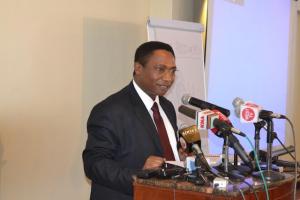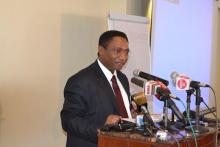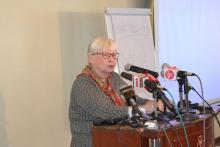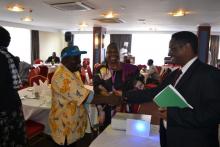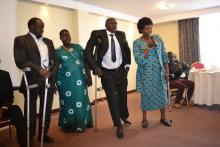Kenya Sustains Polio Eradication Efforts as Year Ends
Kenya’s effort to eradicate polio will this week be further boosted by a national campaign scheduled for December 5-9.
The campaign, targeting 8.7 Million children under 5, will be held nationwide to ensure the immunity of children against polio is sustained and the message for immunization reinforced.
Kenya has sustained a high level of response to the polio outbreak since 2013 through house-to-house vaccination campaigns, surveillance and strengthening of routine immunization. The last case of onset of paralysis was in July 14, 2013.
As part of the campaign preparations, the Ministry of Health this week brought stakeholders together to review Kenya’s status in polio response and eradication efforts, routine immunization performance and what needs to be done.
The meeting was attended by among others, the media, partners, WHO, UNICEF, as well as 14 polio survivors who will support the counties they come from to advocate for immunization against vaccine preventable diseases.
Speaking at the event, Dr Jackson Kioko, head of Department of Preventive and Promotive Health, DPPHS, emphasized the need for regular and continuous interaction between stakeholders on matters of health and intervention because it underlines child survival and development.
He said Kenya had sustained efforts to interrupt polio successfully since no other case had been detected after July 2013 outbreak and that the Horn of Africa was free of the Wild Polio Virus. A recent Horn of Africa final outbreak assessment showed that Kenya had successfully interrupted polio transmission and gotten the country out of the threat it faced in May 2013.
He said immunization still faced challenges and called on stakeholders including the media, to help share information on the importance of immunization to the public and especially caregivers. He suggested that using immunization as a requirement for school enrolment may be considered in the future to ensure all children were immunized. More needed to be done to achieve the Sustainable Development Goals in health given, Kenya had not achieved its goals in MDGs, he added. Fully Immunized Child (FIC) is placed at 68 per cent.
Dr Kioko identified challenges in public health and health systems which had impacted immunization. These include county performances with some doing well while others had challenges; some being silent in their surveillance and not detecting any cases while others were reporting. There were challenges to do with roles at national and county governments after devolution was put in place.
He said there was need to interrogate data to establish what challenges existed as well as enforcing regular performance monitoring and interaction with counties.
Speaking on behalf of UNICEF, WHO and the UN family at large, Dr Pirkko Heinonen , UNICEF Acting Representative, challenged the stakeholders to ensure Kenya did not have another case of polio. “It would be a tragedy to get new cases after what we have done in the last than two years,” she said.
She called on them to embrace the collective responsibility of making sure all children were immunized. “Let us all do what we can to make sure all parents know the importance of immunization and no other child goes unvaccinated. “ “Twenty years from now we should not stand here and say we failed to give Measles Rubella or any other immunization,” she added.
Dr Ephantus Maree, head of Unit of Vaccine Services (UVIS), said the effort to eradicate polio was nearly achieved but counties needed to strengthen surveillance efforts.
He said plans were underway to introduce IPV into the Kenyan vaccine schedule and training of health workers for its use and implementation was almost complete. Measles Rubella would also be introduced, he added.
IPV is the injectable polio vaccine which is being introduced as the plan to remove the oral vaccine, OPV, starts. IPV can safely protect against all types of Polio.
He said the country would implement the ‘Switch’ from trivalent (tOPV) to bivalent (bOPV) next April in which only type 1 and 3 of the vaccine (bivalent) would be used while type 2 would be dropped .The ‘Switch’ will be effected globally by every country.
Harold Kipchumba, the Polio and Immunization Goodwill Ambassador reaffirmed his commitment to ensuring no child died of vaccine-preventable diseases. He said immunization was a responsibility and not a choice. He said plans were underway to help push for laws that would address the immunization issue.
Kipchumba, who recently won the UN Kenya Award 2015 for his effort as an advocate for immunization and eradication of polio, received praises from the stakeholders for initiating county immunization champions who attended the stakeholders meeting. The 13 champions pledged to make a difference in their counties through advocacy and other activities to support immunization.
Kipchumba said the champions would use their life stories to demonstrate the challenges they had faced due to the disabilities in order to encourage parents and communities to get children immunized. “Immunization is a responsibility and not a choice,” he added.
The meeting was also attended by WR Kenya Dr Custodia Mandlhate and other WHO Kenya staff.
The polio campaign is the third this year and is mainly being supported by WHO and UNICEF whose staff is going to be supporting the counties on the house-to house exercise.
_____________________________________________
For more information, please contact:
Jemimah Mwakisha



